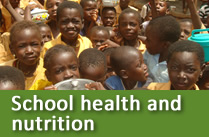 Santé et nutrition scolaire
Santé et nutrition scolaire

The Ghana Food Security Action Plan (GFSAP) defines Nutrition Security as access to adequate quantities of safe quality foods by people at all times, in respect of the basic daily requirements of the individual. The major issues include: protein energy malnutrition, stunting, vitamin and mineral deficiencies in children under-five years, school-aged, pregnant women and lactating mothers.
These issues are often triggered by low dietary intake, inappropriate weaning practices, household food insecurity and parasitic infections.
The 1998 Ghana Demographic and Health Survey puts the incidence of stunting, underweight and wasting at 26%, 25% and 10% respectively. The 2003 survey also indicates that the proportion of children under-five years with stunted growth increased from 28.5% in 1997 to 30% in 2003. In addition, 11 % were severely stunted, 7% were wasted and 1%severely wasted. The figure for underweight was 22% while 5% were severely underweight.
Another interesting statistic is the fact that in the three northern regions where the total infant population is estimated at 700,000, stunted children numbered approximately 280,000 which is about 40% of the populace. Thus, generally, rural children are twice as stunted (30%) as urban children.
The GSFP seeks to address:
- Poverty, that generally impact rural households and communities, and has bigger impact on children particularly under-fives
- Hunger, particularly short-term hunger in children including under fives
- Malnutrition in children and rural households that results in stunting, wasting, poor health including greater incidence of infections, and reduced access to opportunities to escape poverty altogether

